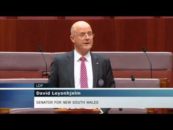The day before my motion to establish an inquiry into the Nanny State passed the Senate, the NSW Parliament enacted legislation that means e-cigarettes will be treated in the same way as tobacco products. The new laws not only restrict the sale of e-cigarettes to minors, but prevent them being advertised and displayed.
It is already illegal to sell e-liquids containing nicotine in Australia, despite nicotine being safe enough to use in patches and gums – standard quitting aids that, incidentally, are heavily advertised. The new laws will send vaping shops broke, while smokers will lose access to probably the most effective quitting aid of all.
All this reinforced the need for an inquiry.
Public health policy is now way beyond its original remit and has become a form of puritanism. Much of the opposition to e-cigarettes arises from the fact that they are pleasant to use. Like the puritans of yore, public health mandarins are haunted by the thought that someone, somewhere, is having a good time.
During debate around the e-cigarette legislation, it was salutary to note how Public Health on the left joined hands with Prohibition on the right, exemplified by extensive cooperation and much mutual back-scratching between Jeremy Buckingham of the Greens and Fred Nile of the Christian Democrats.
The Senate Inquiry I’ll be chairing – to give it its full name, “into measures introduced to restrict personal choice ‘for the individual’s own good’,” – is not just concerned with e-cigarettes or tobacco.
I want to engage in a serious and thoughtful examination of lockout laws and other restrictions on the service of alcohol, the cost of prosecuting recreational cannabis users, the effect mandatory helmet laws have on cycling, and the often demented arguments surrounding video game classification.
But the nanny state problem is not just confined to puritanism, prohibition, and an inability to understand evidence-based policy. It’s much larger.
If we persist in thinking people cannot make simple decisions about what to eat, when to drink, or what games to play, why then do we think they can do something as complicated as choosing between different political visions? If people are so dumb, should they even be allowed to vote?
There are two things going on here. First, those who would treat us like children and substitute the government for our parents have forgotten that suffrage has history. One of the arguments against extending the vote to women and working-class men was that they were not fit to make political choices because they spent their money on frivolities, like beer, cigarettes and lacy dresses.
Every time those in love with their own expertise seek to regulate what people buy or wear or put in their mouths, they forget that the people who purchase and the people who vote are the same people.
There is a serious contradiction in supporting individual choice in the political sphere but not in the commercial sphere. Meanwhile, anyone who suggests markets are less moral than politics or bureaucracies doesn’t know much about either politics or bureaucracy.
Secondly, just because individuals make poor decisions does not mean governments make better ones. There is abundant evidence they generally don’t, and because governments are so large, their bad decisions have far more dramatic, expensive, and destructive consequences: think of the failure of the State Banks of Victoria and South Australia in the 90s; the chaotic response to Hurricane Katrina in the US; and the Abu Ghraib prison abuse scandal in Iraq.
Finally, while people may be bad at dietary choices or have shocking taste in entertainment, they can be skilled at exercising political choice. Moreover, the reverse also applies: for decades, many intellectuals supported communism, a political system that amounted to little more than a licence to murder.
The reason is simple: the experts who purport to have superior knowledge are susceptible to exactly the same sort of cognitive biases and systemic errors as the rest of us. They too are human, with their share of contested divorces, estranged children, serious (albeit secret) addictions, and difficulties with holding down a steady job. These are not the sort of people we should be looking to for moral guidance.
I expect people who consider our personal choices should be regulated will find this inquiry uncomfortable. That’s good. They might think they know better than we do what’s best for us, but they don’t.









